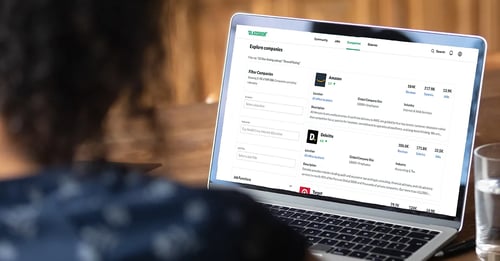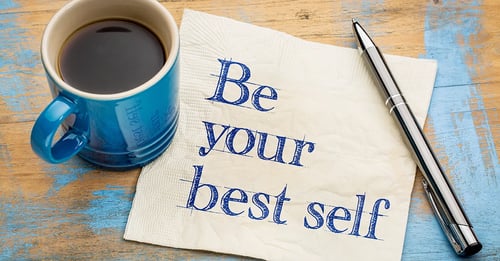11 min read
How to Nail a Job Interview in 2026
By: Essential Education Team on February 18, 2026 at 8:15 AM

Seven seconds. That’s how long research suggests it takes a person to make a first impression. In just seven seconds, the people you meet have an initial sense of who you are and get a “gut reaction” about you. Whether meeting new friends, classmates, or coworkers, those first few moments of interaction are critical.
If you are looking for a new or better job in 2026, then learning how to make a positive first impression can improve your chances of getting hired. Your potential employer may have met you on paper through an outstanding application, cover letter, or resume. Now it’s time to nail the interview!
This can be an intimidating, even scary, process. But these proven tips will empower you to make your mark from the start, leave a lasting impression, and show you are a stand-out candidate. Whether interviewing in person or virtually over Zoom, this guide will help you improve your interview skills, build confidence, and get the job!

Do Your Research
Before interviewing, learning more about your potential employer is important. Having a good sense of what the organization does, what they value, and the position's specific needs will show those hiring that you’ve done your homework. Some of this information will be in the initial job posting. Be sure to take note of any specific characteristics or skills the employer is looking for and think about how you meet those needs.
Dig deeper with an online search. A company’s website will typically include information about the organization’s history, as well as its mission and vision. Jot down a few key points to mention in your interview. Employers are impressed when candidates go the extra mile and show genuine interest in what the business does and how they do it.
You can also learn about employee experiences on corporate evaluation websites like Glassdoor. These sites highlight reviews and ratings from current and former employees. The information will give you a better sense of the company’s culture and day-to-day work environment.
Know Your Resume
During the interview, you will discuss the details of your application or resume. Prepare to personally expand on the experiences and skills you’ve listed on paper. Be specific. Try to share relevant stories and examples when possible. If you’ve included information about a particular skill you possess, use the interview to talk about how you have shown that skill on the job, in the classroom, or in daily life.
For instance, if your resume says that you are a team player, give an example of a time you worked well with others. If your resume notes organizational skills, explain how you stay organized. Think of your resume as a springboard to further discuss all of the things that make you unique and ready to take on the role.
Also, make sure to bring an extra copy of your resume for reference. It’s another way to show the interviewer that you value their time and are prepared.

What to Say in an Interview
An interview is your chance to present your “best self.” Start strong by introducing yourself and kick-starting a conversation about why you should be hired. Showing your best self is nothing more than highlighting what makes you special and demonstrating your valuable skills. This is essential in interviewing for a new job and making a good first impression.
Here’s a quick list of things to mention:
Show how you work. Do you get to work on time? Do you have an eye for detail? Can you do several things at once? Are you organized? Addressing these abilities will shine a light on all you have to add to a workplace.
Show how you work with others. Are you a good listener? Can you communicate well? Are you a leader? How do you deal with conflict? Demonstrating how you will assist and encourage your co-workers is vital to proving your value.
Show your skills. Do you have the skills employers need? Problem-solving, critical thinking, and creativity are in demand. Put your best foot forward by giving examples of how your experience in these areas could be put to work.
How to Answer the Most Important Interview Question
The most important interview question is also the most common: “Tell me about yourself.” Ironically, it’s not really a question but a statement. This brief prompt can strike fear in even the most confident interviewee simply because many don’t know how to respond. But this obstacle can prove to be a big opportunity with a little preparation.
Lily Zang, a professor at the Massachusetts Institute of Technology, has a three-step formula that can help you frame your response and organize your thoughts in a way that makes sense to you and the interviewer.
Here’s the formula in three easy parts:
- Talk about the present.
- Discuss the past.
- Consider the future.
Talk about the present. Talk about what you are doing now. Discuss your current job, your responsibilities, and a recent accomplishment. Your examples can be work, education, or life-related. Just make sure they speak to a specific need or qualification of the job. For instance, if you recently received your high school equivalency credential, you can talk about how your hard work and dedication prepared you for this opportunity. Perhaps you are interviewing for a healthcare position. You can discuss any current medical experience or training you are doing now that will prepare you for a future role.
Applying for a job in a new field outside of your personal experiences? No problem. Note a few transferable skills. If your current job is helping you build communication, customer service, or technical expertise that can be used in the open position, talk about these abilities with confidence. Connect what you are doing now to what you can do for the company if hired.
Discuss the past. Briefly discuss what led you to this point in your life. You don’t want to tell your life’s story, but hit the highlights. Is there a challenge you’ve overcome? A lesson you have learned? Keep it positive and show your strengths. Note relevant previous experiences, even if they seem unrelated.
For instance, have you worked in a restaurant and are now applying for an office position? You have people skills, organizational skills, and the ability to think on your feet. Have you worked a trade or labor-based job? You have the ability to push yourself physically, work hard, and persevere. Skills are skills, and they can be applied in many different career fields. Highlight your past experiences and make them shine!
Consider the future. Are you passionate about a certain field or area of service? Have you always wanted to enter a career related to the position? Talk about your future goals and transition into why this position fits into your success plan.
What do you hope to learn? What skills do you wish to acquire? How can you be of service? In other words, how do your future plans fit the company's requirements? Create a win-win for you and your potential employer by showing how your goals and their needs are linked.
How to Talk About Your Strengths and Weaknesses
Don’t be shy about your strengths. The interviewer wants to learn more about you. Treat every question as an opportunity to highlight your best qualities. Use impact words to talk about your previous experiences. For example, instead of saying “I did,” choose active verbs like “I accomplished” or “I created.” These words project positivity and self-confidence.
Talking about your weaknesses can be tricky. Your interviewer will probably ask you to name a few. Be prepared with a good answer that reflects honesty and a desire to grow. One of the top career development sites, Indeed, provides a terrific list of examples to note in an interview that shifts your struggles into strengths, showing self-awareness and a willingness to learn.
Be careful not to give self-serving answers like, “I care too much” or “I work too hard.” Interviewers have heard those before and often find them insincere.
Be prepared to answer, “Why should I hire you?”
The whole point of an interview is to convince the hiring manager that you are the perfect candidate for the job. Take some Job Ready Courses, earn badges to build your resume, and become the ideal choice for the job. If an interviewer asks, “Why should I hire you?” Get ready to give a good answer.
Explain how your strengths and experiences will benefit the company. Relate your strengths to what you’ve researched about the business or the position. Use this as an opportunity to talk about what you do best and connect your talents to the job you want.

What Not to Say in an Interview
It’s also important to know what not to say during an interview. Some of these tips may seem obvious, but nerves can get the best of us and cause us to make careless comments. Here are a few reminders of things you’ll want to avoid in an interview.
Remember, this is a formal meeting. You’ll want to show confidence and ease, but try not to be too casual. Avoid inappropriate language, comments, questions about the interviewer’s personal life or appearance, and irrelevant stories about yourself. Keep the conversation focused on the job and what you bring to the table. Do not talk negatively about a former employer. Even if you’ve had a genuinely hurtful experience, an interview is not the time to share your feelings. Doing so will be a red flag for the hiring manager.
Watch Your Body Language
Beyond what you audibly say in an interview, it’s also important to think about the unconscious messages you send with your body. Humans communicate a range of emotions and thoughts without saying a word. Consider these body management tips:
Manage your manners. Learn the value of a smile, firm handshake (or equivalent greeting post-pandemic), and solid eye contact. Verbally expressing interest in the position is important. But showing interest with a positive attitude and active listening will make you a stand-out candidate.
Manage distractions. Silence any electronics. This includes cell phones, tablets, and smartwatches. Any instinctual glace away from the eyes of the interviewer could convey disinterest. Never bring coffee or snacks into an interview. This seems obvious, but it happens. In short, don’t bring anything into the conversation other than you and your sparkling personality.
Manage mannerisms. We all have physical responses to nerves or excitement. Nail-biting, fidgeting, playing with hair, or adjusting clothes are just a few traps in which anxious job seekers can get caught. Pay attention to your go-tos and practice avoiding them. Try a mock interview with friends or family. This trial run will ease you and help calm your nervous habits.
Know What to Ask
At some point in the interview, you will be asked if you have any questions for the interviewer. Be prepared with at least 3 questions about the job and company. These questions are another opportunity to impress the interviewer but will also provide more information about your prospective employer.
Here are some examples of good questions to ask in an interview:
- If hired, what will the training process be like?
- What qualities do you value most in your employees?
- What qualities have past employees in this position had that made them ideal for the job?
- How does your company manage performance reviews, promotions, and other internal job moves?
- What has your experience been at the company so far? What roles have you filled, and what do you think has made you successful here?
- What can you tell me about the team I would be working with?
- What is the company culture like?
- What do you wish you knew when you started working here?
- When can I expect to hear from you?
Relax
It might seem like a tall order, but try to relax. An employer can tell when you’re uncomfortable or anxious. That kind of energy can send the wrong message. Bring a positive attitude and do your best to be calm.
If you struggle with pre-interview anxiety, try practicing with a friend or family member to calm your nerves. Try some deep breathing exercises and avoid caffeinated beverages. Remember to get a good night’s sleep, hydrate, and eat a healthy meal.
Frequently Asked Questions
- Can I bring notes to an interview?
Bringing notes to an interview is okay. However, it’s best to keep your notations to a minimum. Remember, an interview is a conversation, not a quiz. Discuss your skills and examples as you would with a friend. Try not to read from a list of bullet points. Keep the tone calm and relaxed.
- How do I know if the interview went well?
You won’t ever really know how an interview went until you find out if you got the job. But there are a few things you can think through to ease your mind. Did you have well-thought-out answers to each question? Did your interviewer smile, nod, or agree with your answers? Were you asked to expand on your stories? Did the interviewer tell you when you should expect a response? Trust your instincts, you’ll probably have a good sense of whether or not you are a good fit for the job.
- I’ve heard about the STAR interview method. What is it?
The STAR method is an easy way to provide examples of your skills in an interview. STAR stands for situation, task, action, and result. Talk about a recent situation or problem you encountered, the task or response you had to perform, what action you had to take, and the result that occurred. These four points help to organize your explanations and create a link between your unique skills and a positive outcome.
- Should I be myself during a job interview?
Yes! You have the opportunity to present yourself as only you can. Present your best self from the onset and shape your story. Employers want to know who they are hiring and choosing to invest in. Show them who you are and what you can do!
Interviewing for a job is not an obstacle. It’s an opportunity to show who you are and what you can contribute. With a little preparation and use of a few best practices, you will be well on your way to wowing potential employers and landing a great job. Improve your employability and interview skills with online classes. You’ll learn how to find open positions, apply, interview, and succeed in the workplace. Start the online Job Ready course today to get the skills you need to jumpstart a successful and profitable career.

